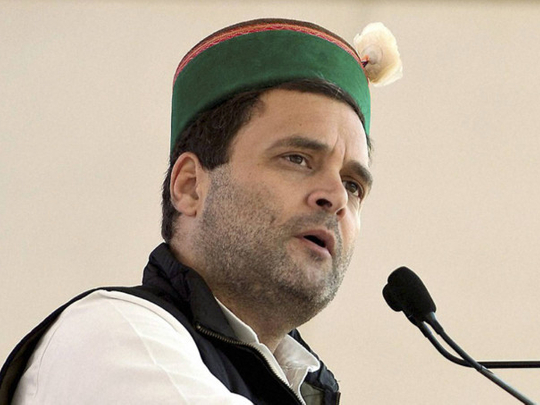
Rahul Gandhi, vice-president of India’s venerable Congress party, made a sensational claim recently. He said that Indian Prime Minister Narendra Modi’s Bharatiya Janata Party (BJP)-led government was “terrified” of letting him speak in parliament because he could make revelations that would cause an “earthquake”. “Read my lips,” he swaggered, and hinted that he had information about personal corruption on the part of the prime minister.
But since then, there has been no riot on the Richter scale. The promised tremblor has not arrived. Instead, Rahul has thundered on about a corruption charge against Modi that was already in public domain — the allegation that two corporate houses paid him bribes worth billions of rupees in 2013-2014 when he was chief minister of the state of Gujarat.
In fact, the Supreme Court had refused to entertain a plea for an investigation into the charge, citing lack of credible material to suggest wrongdoing.
So why did Rahul, the scion of India’s Nehru-Gandhi political dynasty, rake up a non-issue as an earth-shattering revelation? Why promise fireworks and produce a damp squib?
The answer lies in Rahul’s erratic, and often immature, conduct in politics. A conduct that has earned him the image of an ineffectual dynast, one who makes grandiose gestures, but has neither the political acumen nor the organisational flair to revive the Congress from the rubble of its paltry 44 seats in parliament.
And yet, for the 46-year-old Rahul, this is a golden opportunity to launch an all-out offensive against the ruling BJP. He has been the party’s de facto chief ever since his mother, the Italian-born party president Sonia Gandhi, has taken a back seat. For the first time he has a real shot at acing his political adversary, Narendra Modi.
Here’s why.
Modi’s government is now under severe pressure to justify the pain unleashed by its decision to scrap high-value currency notes and cancel about 86 per cent of the currency in circulation. The resultant cash crunch has led to thousands of daily wage earners losing their livelihood. More than 100 people have died standing in never-ending queues before banks and ATMs to access their money. And the central bank’s remonetisation effort has been marred by slow delivery and bottlenecks.
Today, all but Modi’s loudest cheerleaders agree that the economy is heading for a downturn and that the costs of the currency ban may outweigh its much-vaunted benefits.
That’s a lot of ammunition for any opposition party to go gunning for the government.
To be sure, Rahul has tried to do just that in the weeks after Modi’s controversial currency ban. He has kept up a rhetoric of how calamitous the step has been for the poor; he has stood at ATM queues to show his solidarity with the common people; at public rallies he has railed against the ban on currency notes, calling it a “Modi-made disaster”, a scheme to suck money out of the poor to benefit the rich.
It’s a narrative that could find resonance in the crucial state elections in Uttar Pradesh (UP) to be held early next year. To that end, Rahul has been addressing a number of rallies in the state, sending out his message that demonetisation had “firebombed” the poor while the corrupt rich were allowed to get away.
So far so fine. However, making empty boasts is not the best way of gaining credibility as a leader. It makes eminent political sense to attack the Prime Minister on allegations of corruption against him. But it is idiocy to talk about a big-bang revelation and then trot out an old accusation. It’s an invitation to ridicule and Rahul got that in full measure from Modi, who swiftly turned the tables on him and mocked at him for having failed to produce the famed “earthquake”.
By now Rahul ought to have learnt to avoid such missteps. His leadership has so far not borne fruit for the Congress. He oversaw the party’s stunning rout at the hands of the BJP in the 2014 general elections. Since then, India’s oldest political party has lost several state elections and is now in power in just seven states — down from 11 in 2014. The party’s prospects in the upcoming elections in UP and Punjab are not too bright either.
Indeed, such has been the disappointment over his stewardship, that earlier this year, there was talk that his younger sister, the comely and charismatic Priyanka, would be the face of the party in the forthcoming UP elections. For some reason — and this may ultimately be the Congress’s undoing —the party can never think beyond a Gandhi as its leader.
That said, the distress in the wake of the currency ban and its likely economic fallout have presented Rahul with an opportunity to move in for the kill. He should seize the day and stay the course. This is his chance to grow into an opposition leader who can chip away at the might of the BJP and be a credible threat to it.
The time for impetuous, ill-considered political gambits has passed. For Rahul Gandhi, it’s now or never.
Shuma Raha is a senior journalist based in New Delhi.








